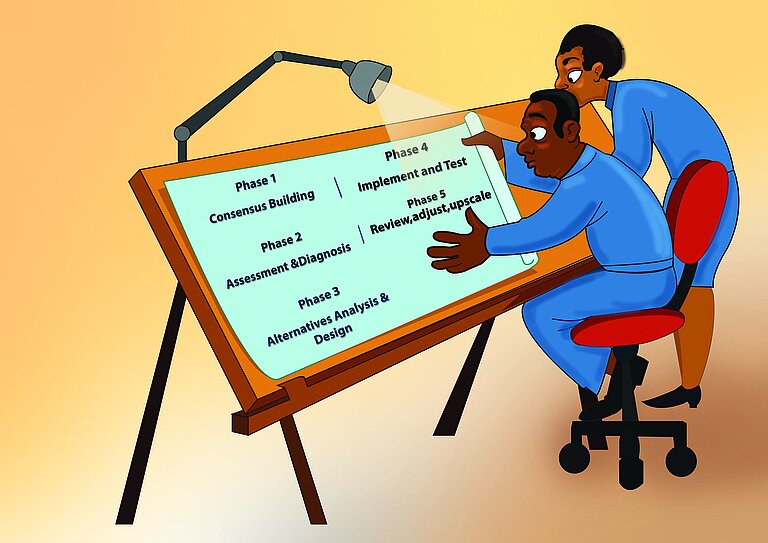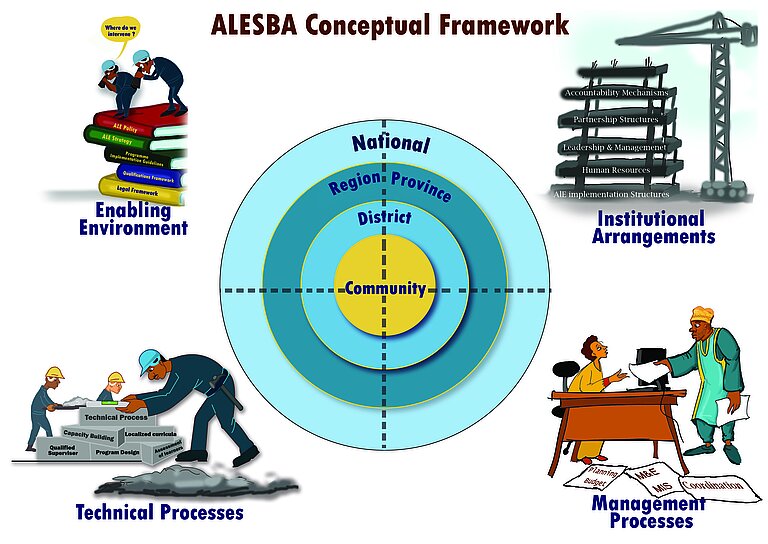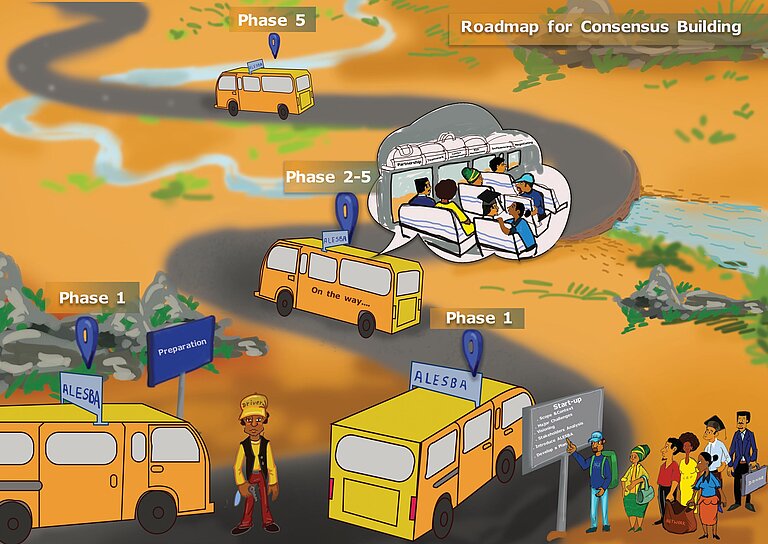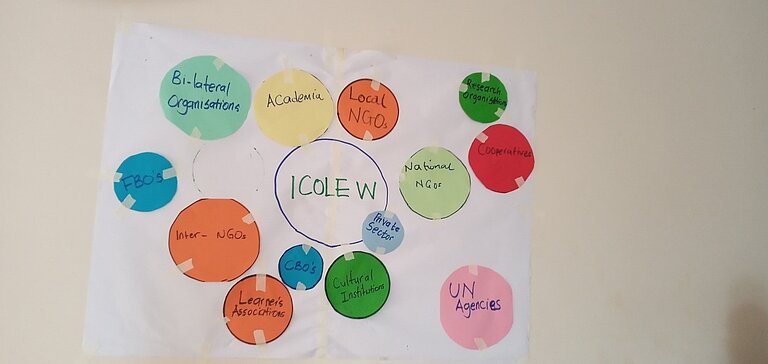Uganda: Adult learning and education – A system-building approach

What is the Adult Learning and Education System-Building Approach?
The Adult Learning and Education System-Building Approach (ALESBA) describes a complex system, on different levels, which claims to take into account all components for a sustainable adult education system. This system-oriented approach is understood to be universal and can be applied to adult education systems in different contexts and countries. Importantly, it is an outcome-based system. It means that an M&E system or adult learning and education (ALE) related policies must be in place, but how these system components are developed and implemented is up to the respective stakeholders.
The approach includes a conceptual guiding framework, concretely defined implementation phases, and a set of methods and tools that can be applied in each phase. The overall objective of the approach is to build sustainable adult education systems together with all stakeholders in order to improve the provision of integrated adult education services in line with learners’ needs and interests. Consequently, the approach targets both the supply and demand side of ALE.
Components of the ALE system
A system is generally understood as a unit of different elements and processes that are interconnected and interdependent via feedback loops. A system design in ALE includes an assessment and diagnosis process of the system, identification of alternatives to redesign or improve the system, testing of the improved system design, implementation of corrective measures and expansion of the system to reach a larger target group.
A fully functioning adult education system requires the following four main components:

The Uganda example
In 2014, DVV International and the Ministry of Gender, Labour, and Social Development, and its counterparts at local government levels, formed a strategic alliance to pilot regional development in four districts through ALE. The ministry established a programme called Integrated Community Learning for Wealth Creation (ICOLEW). It consists of different components (functional adult literacy, livelihoods skills training, business skills training, and community development). The goal of the collaboration was to systematically improve ALE using a systems approach. In addition, community learning centres were established for this purpose that provided the necessary infrastructure.
Consensus Building
The first step was to establish a common understanding of the ALE system. Representatives of DVV International, the ministry, and representatives of the four districts met regularly to agree on the various building blocks of the ALE system and to translate this concretely to the realities in the districts and at the national level. Furthermore, it was of great importance to establish a common consensus on terminology and the concrete approach. On the basis of this, conditions were created for mutual understanding and the joint carrying out of the steps to establish an ALE system.

Assess the status of programmes/projects
The next step was to concretely assess the quality of the building blocks of the ALE system. This was done in four pilot districts as well as on the national level. In order to involve the stakeholders in the process, peer review procedures were carried out. In concrete terms, this means that different groups of experts were formed. The experts were representatives from DVV International, the ministry and colleagues from the districts. They formulated questions derived from the building blocks of the adult education system.
Questions were developed for all 20 building blocks of the ALE system and served as a guide for the following interviews. The expert teams visited the respective district and conducted interviews with persons responsible for the implementation of the ICOLEW programme and thus the implementation of ALE. The answers were noted and summarized in a report.
Later on, a one-week workshop was held in Jinja (Uganda) from 27 August to 4 September 2021, attended by all peer review teams as well as representatives from DVV International and the ministry. The aim of this workshop was to determine which elements and building blocks of the system were in place and how well they were functioning. The different peer review teams presented their diagnostic results and identified both the assets in their respective district and the challenges and weaknesses.

The following example will illustrate the findings (for all building blocks of the adult education system):
Policy: Key Findings
- Existing policies are adequate for ALE /ICOLEW implementation.
- The Uganda national adult literacy policy 2015 exists.
- This policy comprehensively addresses the needs and interests of the learners while it guides in the identification of key roles and development of learning materials.
- The policy allocates roles and responsibilities to different stakeholders at all levels.
Policy: Main Challenges
- Policies are not adequately disseminated and translated into the local language.
- Cross-sectoral integration and implementation of the policy is limited.
- Policy formulation was less consultative than desired; consultative only at regional level where some of the technical staff from the district attended.
Remarkable was the great openness of the speakers to name critical aspects of the system. And just as remarkable was the willingness of the reviewed district to accept this criticism and to deal with it constructively in order to see how the challenges and problems can be concretely remedied in the next step.
Further assess the underlying causes and blockages in the system
In the next step, the commonalities of the challenges of the four districts were compiled and systemic and correlated challenges were identified. The summary of the individual analyses was as follows for building block number one:
ALE Policy: Key Findings
- Policies were disseminated through workshops at national and regional levels.
- There are plans to broaden the policy to ALE.
ALE Policy: Main Challenges
- The policy is narrow and covers only literacy instead of the broader ALE.
- Inadequate resources did not allow policy dissemination at district level.
- Resources for policy implementation are grossly inadequate.
- Inadequate staffing to implement the policy.
Based on these findings, the next step is to set in motion the following phases that are necessary for the successful implementation of an ALE system:
Searching for the best entry points to address system challenges
In this phase, the results of the system analysis were used for the annual planning of DVV International as well as for the ministry and the districts. Very specifically, actions were defined to be implemented in the next step to work through and ultimately address some of the identified blockages.
Once measures have been successfully implemented, two more phases will follow:
- Implement and test the newly designed system in selected areas over time.
- Reviewing this system, making necessary adjustments and up-scaling for improved adult education service delivery.
Final assessment
Basically, it can be said that this is a participatory process which is supported by the stakeholders themselves, who want to drive the process forward with commitment and dedication. The extremely high level of commitment and self-critical examination of the quality of the ALE system in the districts is particularly noteworthy. Also noteworthy is the willingness of the responsible politicians to create the necessary conditions to make ALE a success. Based on the steps taken so far, it can be assumed that the ALE system will be established successfully and, above all, sustainably. The implementation of the ALESBA approach in Uganda can serve as an example and an orientation and deserves appropriate attention in the ALE community.




